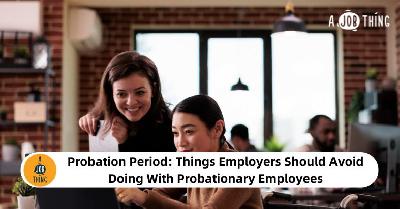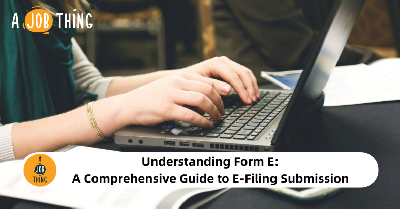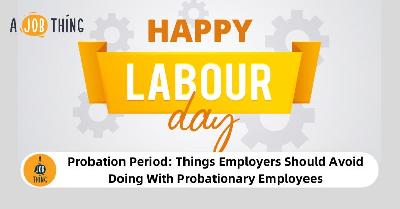
Guidelines To Prevent Employees From Suing During Termination
Create Job Description Using AI
Write appealing job descriptions for any job opening to attract the most qualifield and suitable candidates. FOR FREE.
try now
According to the Employment Act 1955 Malaysia(14), the termination of the contract for special reasons
(1) An employer may, on the grounds of misconduct inconsistent with the fulfilment of the express or implied conditions of his service, after due inquiry --
(a) dismiss without notice the employee;
(b) downgrade the employee, or
(c) impose any other lesser punishment as he deems fit, and where a punishment of suspension without wages is imposed, it shall not exceed two weeks.
(2) For an inquiry under subsection (1), the employer may suspend the employee from work for a period not exceeding two weeks but shall pay him not less than half his wages for such period:
Provided that if the inquiry does not disclose any misconduct on the part of the employee, the employer shall forthwith restore to the employee the full amount of wages so withheld.
(3) An employee may terminate his contract of service with his employer without notice where he or his dependants are threatened by danger to the person by violence or disease such as such employee did not by his contract of service undertake to run.
After a thorough investigation, the employer may impose appropriate punishment, including dismissal without notice, demotion, or any lesser sanction.
Before rendering a verdict, the employer must conduct a thorough investigation and allow the employee to present a defence before an impartial panel.
In addition to the preceding, during the investigation, the employer may suspend the employee for up to two weeks if their presence at the workplace would affect the investigation. For example, they were falsifying evidence or threatening witnesses.
Minor Misconduct vs Major Misconduct
What is minor misconduct?
The list of behaviours that could be considered minor misconduct is sweeping, but here are a few:
- Persistent lateness
- Not completing a task on time
- Performing work improperly
- Not correctly controlling your attendance
- Not following proper procedures
What is major misconduct?
Major misconduct is action by an employee that is severe enough to threaten the relationship between employer and employee. The conduct must be intentional or constitute gross carelessness for the employer to have the right to terminate the employee immediately and without warning.
Typically more severe than minor misconduct, major misconduct includes:
- Theft or deceit
- Physical assault or threats
- Purposeful and severe property damage
- Serious misappropriation of the company's name or assets
- Accessing intentional websites containing obscene or insulting content
- Racism or intimidation
- Bringing the company's reputation into extreme contempt
- Significant incapacity to work caused by alcohol or illicit drugs
- Causing loss, damage, or harm via gross carelessness
As soon as the matter is reported, the management and HR representative are responsible for conducting a fact-finding investigation.
However, if the misconduct is minimal, the employee's immediate supervisor is recommended to conduct a counselling session with the employee before the employee's behaviour escalates to the point where it negatively impacts the workplace.
Fair hearing
Regardless of the cause, the employer must provide the employee with a written explanation of the grounds for the termination. It contributes to the process's procedural fairness.
From the employer's perspective, it is permissible to fire an employee if there is a valid reason and the employee is informed of the reason. Under Malaysian labour law, all termination letters must state the cause for the separation.
Even though the employment contract contains language granting the employer the right to terminate with notice, the employer cannot dismiss the employee based only on this provision. The employer must still provide justification and explanation.
Guideline: Procedural Fairness
In addition to presenting a valid basis for dismissing an employee, companies must do it reasonably. Fairness in procedure pertains to the actions performed during the dismissal procedure.
These would be examples of steps to include in a fair procedure:
- According to Malaysian labour law, the employer must provide the employee with a notice of termination that specifies the cause for the termination.
- Ask the employee for an explanation.
- Allow waiting for a response.
- A domestic investigation must be scheduled immediately if the issue is not resolved. The internal investigation aims to acquire facts and information regarding the employee's suspected wrongdoing or poor performance.
- The investigation panel must be objective.
- Relevant witnesses should be called.
- The investigation must be unbiased and fair; it cannot be viewed as a mere formality to comply with the procedure.
- The primary objective is to collect sufficient material to determine if dismissal would be justified.
- Keep records of the proceedings.
Keynote
The Labour Relations Act 1967 does not explicitly mention initiating a domestic investigation. In certain instances, the Industrial Court determined that the absence of a domestic investigation was not necessarily fatal to procedural fairness under the Labour Relations Act.
Employers subject to the Employment Act must conduct a domestic investigation. And it is always preferable to err on real justice and fairness.
For more HR-related content, visit our HR Library!






